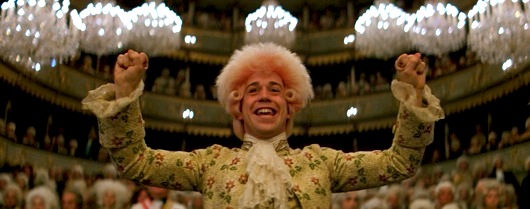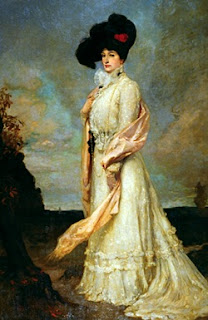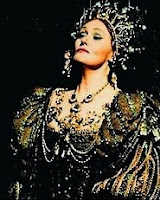 |
"No che non sei capace" K. 419 (Mozart) |
 |
| The Hungarian soprano today. |
 |
"No che non sei capace" K. 419 (Mozart) |
 |
| The Hungarian soprano today. |
 performance in the theater, whether she's satisfied with her work (she admits to being a perfectionist), her first experience singing the Sheperd boy in Tosca as a child and how it launched a career of music, as well as plans for singing Cleopatra in Händel's Giulio Cesare for the 2012 Salzburg Festival. Watch the video after the jump.
performance in the theater, whether she's satisfied with her work (she admits to being a perfectionist), her first experience singing the Sheperd boy in Tosca as a child and how it launched a career of music, as well as plans for singing Cleopatra in Händel's Giulio Cesare for the 2012 Salzburg Festival. Watch the video after the jump. |
| Lunch location for MET singers and staff. (Photo: Daniella Zalcman/Wall Street Journal) |
 |
| Originally a Canadian Opera production, the set allows singers to be submerged. (Photo: Michael Cooper) |
 |
Scène de la Crau: "Voici la vaste plaine" Mireille (Gounod) |
 |
"Va godendo vezzoso e bello" Xerxes (Händel) |
 |
"So anch'io la virtu magica" Don Pasquale (Donizetti) |
 |
"Dove sono" Le Nozze di Figaro (Mozart) |
 |
"Tu, tu piccolo iddio" Madama Butterfly (Puccini) |
 |
| Nathan Gunn as Tarquinius |
 |
| Kirchschlager as Lucretia |
 |
| Peter Gelb's wife will conduct |
 |
| The soprano with Plácido Domingo |
 |
| From left to right: Taddei, O'Neill, Cole, Makisi (Photo: Marion Dijk/Nelson Mail) |
 |
| (Photo: Ken Howard/The Metropolitan Opera) |
 |
| (Photo: L'Oiseau-Lyre/Decca) |
 |
| Rinaldo and Armida in the Garden by Giambattista Tiepolo (c. 1752) |
 |
| Proud Mutter in Vienna (Photo: Johannes Ifkovits/Opera News) |
 |
"Come per me sereno" La Sonnambula (Bellini) |
 Festival, La Scala performed their production of Bellini's La Sonnambula with Maria Callas as Amina. The production was so successful that the company added an additional performance. Callas however declined to perform due to illness, saying that she had already appeared in the other performances against her doctor's orders. Scotto, covering the role of Amina, replaced Callas on September 3, 1957. The performance was a great success, and the 23-year-old Scotto became an international opera star. In 1961 she performed Amina again at Venice's La Fenice with tenor Alfredo Kraus with whom she shared the same teacher, Mercedes
Festival, La Scala performed their production of Bellini's La Sonnambula with Maria Callas as Amina. The production was so successful that the company added an additional performance. Callas however declined to perform due to illness, saying that she had already appeared in the other performances against her doctor's orders. Scotto, covering the role of Amina, replaced Callas on September 3, 1957. The performance was a great success, and the 23-year-old Scotto became an international opera star. In 1961 she performed Amina again at Venice's La Fenice with tenor Alfredo Kraus with whom she shared the same teacher, Mercedes |
| Actor Tom Hulce portraying Wolfgang Amadeus Mozart in what would become the role of a lifetime. |
 Wolfgang Amadeus Mozart. Perhaps at first glance the project may not have appealed to a high-brow society that puritanically fills concert halls and opera houses but it manages to introduce moviegoers to wonderful Mozart compositions, some for the first time. "Amadeus is a magnificent film, full and tender and funny and charming -- and, at the end, sad and angry, too, because in the character of Salieri it has given us a way to understand not only greatness, but our own lack of it. This movie's fundamental question, I think, is whether we can learn to be grateful for the happiness of others, and that, of course, is a test for sainthood." - Rogert Ebert, film critic. Read more about Mozart, Salieria, the cast of the film, and learn more about the music featured in Amadeus, after the jump.
Wolfgang Amadeus Mozart. Perhaps at first glance the project may not have appealed to a high-brow society that puritanically fills concert halls and opera houses but it manages to introduce moviegoers to wonderful Mozart compositions, some for the first time. "Amadeus is a magnificent film, full and tender and funny and charming -- and, at the end, sad and angry, too, because in the character of Salieri it has given us a way to understand not only greatness, but our own lack of it. This movie's fundamental question, I think, is whether we can learn to be grateful for the happiness of others, and that, of course, is a test for sainthood." - Rogert Ebert, film critic. Read more about Mozart, Salieria, the cast of the film, and learn more about the music featured in Amadeus, after the jump. |
| Portrait by Rupert Bunny (1902) |
 |
"Depuis le jour" Louise by Charpentier (rec. 1913) |
 |
| Machaidze as Fiorilla (Photo: Lawrence K. Ho/L.A. Times) |
 |
| Sutherland as Lucrezia |
 |
| Early portrait of Caballé |
 |
"La mamma morta" Andrea Chénier (Giordano) |
 |
| Fooling around as Nedda |
 |
| The 1984 autobiography tell-all |
 |
| Scotto in Florence (1961) |